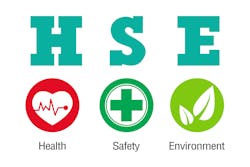How to prevent illness, injury in recycling operations
By Erich Lawson
Compactor Management Co.
You might be surprised that the recycling industry is rated America’s fifth-most-dangerous industry. Yes! Technology does help a lot to minimize health and safety risks by reducing human labor. Still, human intervention is required in many departments, such as segregation for the quality recycling commodities to generate maximum profits.
Health Hazards and Safety Risks Recycling Workers Face
Heavy and moving machinery. The types of machinery used for recycling are heavy and mostly moving, making it difficult to stop an undesirable event. Thus, any fault in handling or maintaining equipment such as balers, sorting machines, compactors and conveyor belts in a recycling plant can prove fatal.
Respiratory hazards. The dust and airborne contaminants produced by recyclable materials can easily be a respiratory hazard for recycling workers as they are in constant contact with the material. While recycling plastics, workers also come across glass, biohazards, toxic substances and rotten food. Inhaling these substances regularly can lead to serious health hazards.
Biohazards. Although there are separate bins for different recyclable materials, there is still not enough awareness about what is recyclable and why to put different materials in different bins! Therefore, workers can often come face to face with biohazards such as chemicals, motor oils, mercury, batteries, solvent, etc. Sharp materials such as wood shards and broken glass can cause a deep cut on your skin and make way for biohazardous substances to enter your body.
Repetitive motion. Recycling plastics demands a lot of movement. Movements such as twisting, jumping, bending and reaching to far points on the fast-paced machineries poses risk of stress injuries in the joints and back muscles due to prolonged movements.
Moving vehicles. There is no dearth of moving industrial vehicles in a plastic recycling plant for transporting waste and recyclables. The materials can weigh multiple tons, and the vehicles that move them, such as forklifts, trucks and front-end loaders, are also heavy. The safety risk of being struck or run over by any heavy moving vehicles is always present for recycling workers.
What Can Recycling Employers Do?
Here are some crucial steps the employers and the management of the plastic recycling industry can take to make the workplace safe and healthy for their workers and employees.
Take care of dust and mold in the air. Install a local exhaust ventilation system close to the belt to suck the dust, mold, chemical vapor and bacteria before spreading in the workplace. You can also use misters to keep the dust down.
Provide respirators. Respirators protect against dust and airborne particles. Provide respirators to your employees and workers which fit them well. Educate your people to use, clean and store these respirators properly. The N95 dust mask and air purifying mask are ideal supplies in this category for recycling workers.
Make preparations to handle hazardous materials. Hazardous materials inevitably appear in the bin, no matter how much effort the municipality puts into educating the public.
It’s better to prepare in advance. Make a plan to prevent [injury to] your workers if any chemicals appear during your regular procedures. Also, train your employees to recognize the harmful chemicals and the related health hazards.
Remove diesel exhaust. You can take the first step in this direction by restricting the entry of trucks into indoor work areas as much as possible. Also, trucks must be turned off if they enter the building. If there are idle trucks inside the premises, install a system to remove the exhaust from the building.
Provide clothes and space to change and clean. Workers should wash up before eating and drinking inside your facility. Provide them with soap and water. Also, provide them with the space to get cleaned before leaving, such as a shower room, changing room and lockers. The cafeteria or canteen must be away from work to avoid direct health and safety risks.
How Can Recycling Workers Take Care of Their Health and Safety?
It’s the duty of every recycling worker to protect oneself from health and safety hazards by taking all necessary preventive steps. They must not forget to do any of the following:
- Wear everything provided to them as PPE (Personal Protective Equipment), including gloves, respirators, safety glasses, etc.
- Keep the work areas and floors clean.
- Washing hands and face before eating or drinking anything. Also, washing up before going home.
- Don’t take work clothes and shoes home. Leave them at work.
- Consult your physician about your working conditions, including the dust and mold you may be inhaling.
Better Safe than Sorry!
The management of the plastic recycling industry must do everything in their control to minimize the health and safety risks to workers. It’s possible when everyone across the organization is fully committed to safe operation.
Therefore, safety must be a part of the working culture of every recycling company to make existing employees feel safe and attract a talented workforce.

